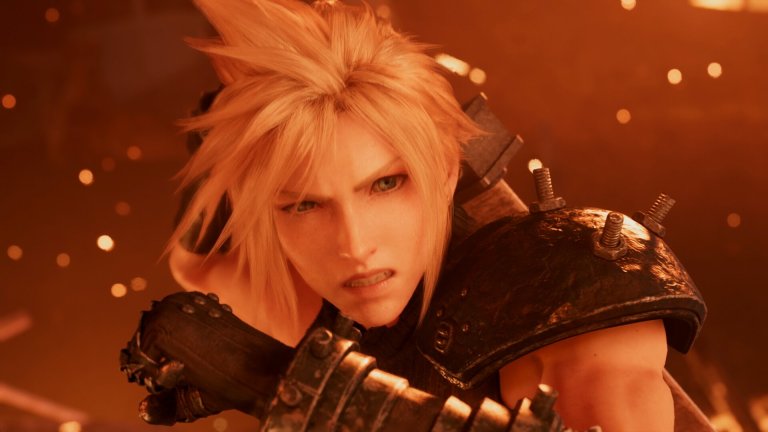Final Fantasy 7 Remake Review: A Love Letter to the Original
Final Fantasy VII Remake is everything fans of the original could have hoped for and more. Read our review of the long-awaited reimagining of the beloved Final Fantasy VII.

When considering the value of a remake, particularly of a classic game or movie, my measurement of its success boils down to this: Does it capture the essence of the original? Does it feel as special as the original? Was it worth remaking the original in the first place?
Final Fantasy VII Remake, for all of the hype and years of waiting, answers all of those questions with a resounding “yes.” But it also goes above and beyond to offer a faithful yet completely different experience than its predecessor. It captures the essence of the original 1997 classic and also builds on its foundation, introducing brand new ideas that transform the original concept in fascinating ways. Unlike most remakes, this lovingly-crafted RPG feels like it carries on the original game’s legacy rather than exploiting it. What’s more, the remake cements itself as one of the essential games of this console generation.
The remake takes the original game’s creative mission–tell an epic story in cinematic fashion, with relatable characters adventuring through a massive, richly textured game world–and accomplishes it yet again, but in a different way. The original turn-based combat system has been replaced by third-person action-RPG combat more akin to modern Square Enix titles like Final Fantasy XV. The characters are more complex and brought to life by talented voice actors and Square Enix’s artists and animators. The story is much more intimate and expansive despite the fact that the entirety of the remake encompasses only about the first five hours of the original game’s campaign.
Square Enix took a lot of risks here. The studio didn’t play it safe by simply updating the original game with pretty graphics and a beat-for-beat retelling of the story. The decision to set the entirety of the game in the city of Midgar was a bold one, but just to get this out of the way, I’ll tell you now that the risk yielded massive rewards. “Zooming in” on the first section of the original game has allowed Square Enix to flesh out and expand the story and characters in a way that not only pays homage to the source material but realizes its artistic vision in a deeper, more complete way. Final Fantasy VII Remake is long (it took me almost 40 hours to complete), grandiose, has sky-high production values, and feels like a complete, contained story. Without a doubt, you absolutely get your money’s worth here.
The pillars of the original story stand strong: mercenary Cloud Strife, his eco-freedom-fighter cohorts Barret and Tifa, and compassionate flower girl Aerith take on the Shinra Corporation, who mine and deplete the planet of energy-rich Mako in order to power Midgar and provide safety and comfort to its citizens. Cloud is still a mopey asshole, Barret still has a mouth as big as his gun arm, and Aerith’s positivity still pierces through the game’s dark overtones like a beacon in the night. The major story developments remain largely unchanged.
Release Date: April 10, 2020
Platform: PS4
Developer: Square Enix
Publisher: Square Enix
Genre: RPG
Just as the remake’s visuals are in higher definition than its predecessor, its story is told in higher detail as well. We learn new things about the characters, like how Wedge loves cats (it’s adorable and it makes sense). A character like Jessie, who was little more than a blip in the original game’s grand narrative, now provides some of the story’s most memorable, emotional scenes. And while we always knew Cloud was a mercenary, now we get to actually collect bounties with him across Midgar. You really get a sense of how big and bustling the city is, and in general, Final Fantasy VII Remake has an impressive sense of scale and depth that puts to rest fans’ worries about the game feeling cursory or insubstantial.
Some of the issues with the original story remain—many of the villains feel interchangeable and the plot gets more convoluted as it unfolds. But while the plot can be a little messy and illogical, the emotional journeys of the characters are the main focus, which really gives the story gravity and makes things easier to digest and invest in. Square Enix games can sometimes feel soulless and overwrought, bogged down by lore and exposition, but that’s not the case here. This is a soulful game full of genuinely moving character moments and voice actors who actually sound like real people dealing with real issues (only Barret’s voice actor ever ventured into over-the-top territory, but it’s tasteful for the most part).
Storytelling is the priority in nearly every moment of the game, whether it be during cutscenes, exploration, or even during combat, and I loved this. The characters are constantly exchanging playful banter (Final Fantasy XV fans, rejoice), and obviously, the fact that the characters are brought to life with voice actors and gloriously detailed character models gives the game a much fuller cinematic quality than the original had.
Another thing that stands out to me as a reason the remake is so darn good is the presentation. One of the main reasons the original Final Fantasy VII was such a groundbreaking game was the way it looked and sounded. When it debuted in 1997, it was arguably the most cinematic game ever created, with dazzling FMV cutscenes that truly breathed life into the already excellent story. On top of that, the character and environmental designs were iconic (still are), and composer Nobuo Uematsu arranged one of the greatest video game scores of all time. It looked and sounded more like a big-budget movie than any game that had come before it.
And just like its predecessor, Final Fantasy VII Remake feels like a AAA title through and through. The visuals are spectacular, with cutscenes so exhilaratingly cool that they had me gasping for breath. The score is sweeping and fun and evocative and everything a Final Fantasy fan could ask for (the original themes return with new orchestral arrangements, alongside new songs). And the massive, detailed 3D environments are even more lush and ravishing than the original 2D painted backgrounds. Square Enix games almost always have high production values, but Final Fantasy VII Remake is particularly polished.
The main character models are beautifully rendered, detailed down to the buttons and zippers on their hilariously impractical combat attire, and their animations during battle are just as incredible. The environments are stunning too—the slums of Sector 5 and Sector 7, the neon-lit alleyways of Wall Market, the cold, haunted train graveyard, and pretty much every locale in the game delivers a beautiful backdrop for the adventure. The game’s lighting is incredibly atmospheric, too, and always seems to match the mood of the score, which is a masterstroke that shouldn’t be overlooked.
There are some weak spots in the visual presentation, though. Textures often take a long time to load when exploring the environments, while some textures are downright garish whether they’re fully loaded or not. These drawbacks can act as distractions at times, but the art design is so strong that, like many Nintendo titles, the technical flaws are more easily forgiven.
One of the most obvious gameplay changes from the original game is the battle system, which lets you control your party members directly and switch between them on the fly. You can simply smash the attack button to get through battles if you like, but this won’t get you far—it’s essential to use the unique abilities of each character as well as spells equipped through the Materia system. Enemies are all susceptible to different types of attack (typically elemental) and outfitting your party to exploit the weaknesses of enemies is key.
In addition to the real-time battle system, you’re also able to slow time down to a crawl in tactical mode, which allows you to employ abilities, spells, and items in a more deliberate way. The game offers a classic mode that focuses on tactical combat, but playing a mix of both real-time and tactical battles is the way to go. As a fan of turn-based, traditional RPG combat, I can say that the dynamic nature of Final Fantasy VII Remake‘s combat is a better fit in the context of the game as a whole.
Because enemy encounters take place in the same environments you explore, there is a seamless transition from battle to exploration, which is more conducive to the game’s cinematic nature. Storytelling is all about rhythm and eliminating the recap screens at the end of battles allows the experience to be more fluid.
The endless dungeon crawling and level grinding of the original game is almost discouraged this time around. Final Fantasy VII Remake is a decidedly linear experience, though there are a handful of sections in the campaign that allow you to explore freely and complete side quests at your leisure. These sections could be dismissed as filler—fetch quests aren’t everyone’s cup of tea—but I like the way these calmed-down sections of the game break up the rhythm of the main story.
I never tired of combat and I think that can be attributed to the fact that each of the four playable characters feels completely different on the battlefield. Barret’s long-range game is delightfully destructive, and while Aerith is range-y too, her magic attacks and supports are more elegant. Cloud and Tifa both do massive damage in close range, but Cloud’s swordplay feels more muscly and concussive, while Tifa’s martial arts attacks are lightning-quick, her movement more nimble. All four are satisfying to play, for different reasons. While you mostly explore Midgar as Cloud, you do take control of the others during specific exploration sections as well, which is a treat.
Some of my favorite memories of Final Fantasy VII revolve around leveling up and grinding my way through the game. For what it’s worth, that is not what Final Fantasy VII Remake is about, mostly because the story takes precedence and you’re strongly encouraged to keep the plot train moving. I enjoyed this way of playing too, though it does mean that the game is far less replayable than its predecessor. Not a bad thing, just a notable difference.
And speaking of memories, some of the most memorable moments from the original game are expanded and fleshed out here to wonderful effect. From the revamped motorcycle sections (which introduce a fun new character, the thrill-seeking biker Roche) to Cloud’s cross-dressing exploits with the boarish Don Corneo, the nostalgia is amped up to 11 for old-school Final Fantasy VII fans. And don’t get me started on the final act—it’s one of the most thrilling, rousing, nail-biting endings I’ve played in a game in recent memory. I felt like a kid again.
Final Fantasy VII Remake is special because it pays respect to its predecessor by matching its artistic ambition. For as much as the game is about paying tribute to the original, it’s perhaps even more about improving upon it, which is risky. But Square Enix did what it set out to do, and the fact that, so far, its vision for an epic retelling of Final Fantasy VII is pretty fantastic, is a big victory. This is a game that fans and newcomers alike are sure to enjoy as much as the original.
